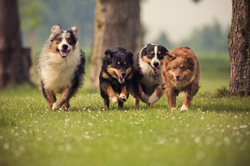 You will hear this often, from the rescue, breeder or shelter, your kennel club or dog obedience instructor and even the vet – you must socialize your dog! Even though the most important and dire time to socialize a canine is during his two fear periods in puppyhood, a dog continues to learn about the world around him throughout his entire life. This means even adult dogs can be socialized, but it will take more time, effort, and empathy on your part to help him past his fears, reactive behaviors, and any other issues you may see in him due to lack of socialization.
You will hear this often, from the rescue, breeder or shelter, your kennel club or dog obedience instructor and even the vet – you must socialize your dog! Even though the most important and dire time to socialize a canine is during his two fear periods in puppyhood, a dog continues to learn about the world around him throughout his entire life. This means even adult dogs can be socialized, but it will take more time, effort, and empathy on your part to help him past his fears, reactive behaviors, and any other issues you may see in him due to lack of socialization.
What Does Socialization Do?
Socialization is more than just helping a dog learn to be friendly around other people and dogs. It is far more than learning to communicate with other canines so that he can be safe at the dog park or play with your neighbor’s pets and kids. Socialization helps your dog become comfortable and learn the proper way to react, or not react, so certain situations, environments, and even objects. Everything from ground and floor textures to common household items such as baseball caps and umbrellas are all a part of the socialization schedule all dogs should go through during puppy hood.
Puppies go through two fear periods during their first year of life. These fear periods are the sections of growth in which a dog’s understanding and reactions to certain things, including perceived threatening situations, are ingrained into his mind. This could be anything from barking on leash at other dogs to being overly playful at watching children run past during a walk. The importance of socialization lies in the control you have over the events during his socialization. If you can create completely controlled situations in which he is rewarded with positive associations each time, his behavior as an adult will be little to no fear, full of confidence and trust in you as his leader and guardian.
How To Do It
Too many owners and even trainers believe that socialization is nothing more than exposure. This is so far from the truth! It is a combination of exposure with your control and positive rewards for the dog or puppy. This does not always mean food rewards, though! Especially for a puppy during his fear stage, just the ability to quickly recover from a fear response and be met with praise, pets and play is plenty to socialize him with an object, place, sound, person or other animal. Typically, this only takes a few minutes! You can spend 5 minutes showing him that an umbrella is nothing to fear and he will be okay with these, and other objects like it, for the rest of his life.
Always start small, start easy, and never push it! Work at his own pace so that he can learn, explore and develop the correct emotion and reaction to anything you are socializing him with before pushing forwarded. For example, if you are teaching him that umbrellas are not scary, you first should start in your home where it is comfortable and quiet. The umbrella should be closed, and left to sit on the ground. If you sit in the floor with him, he will be more relaxed and feel safer. Encourage him to sniff and check out the item on the floor. Every time he does, praise him! Move it around a little, turn it onto different sides and ask him to check it out. Every time he does, he should be praised. Then, you can open the umbrellas and do the same. You can open it a little or all the way, and ask him to sniff it, paw at it, put his mouth on it and push it with his nose. These are all ways puppies learn! Move it into different positions, different rooms, and eventually take it outside. He now knows that umbrellas are not dangerous and pose no threat to him! This is the same formula for all types of socialization with people, medical equipment, hats and big coats, other animals, and more. Take it slow, go at his pace, and always make it a fun and safe event for him to experience!
Dogs Notice Subtlety
While it may not seem like a big difference to us, something as simple as a different floor texture, sound, smell or even a different person holding the leash can be a huge change for a dog during socialization. This is why it is important to change things around during this period of time, as well as during training. Your dog may be perfect sitting on first command in your home, but once outside he has lost his mind! This is because he must be trained both inside and outside, in grass and on the sidewalk. These differences are big to a dog, and reminding him of his training with positive reinforcement plays a big role in socialization, too. He may feel safe around an umbrella in your home, but above a stranger’s head outdoors may scare him. Introduce him to many different situations with possibly scary things so that he will be safe, secure and happy no matter what life throws at the two of you!
Visit Pampered Paw Gifts.com to Search For Treats and Gifts For Your Dog